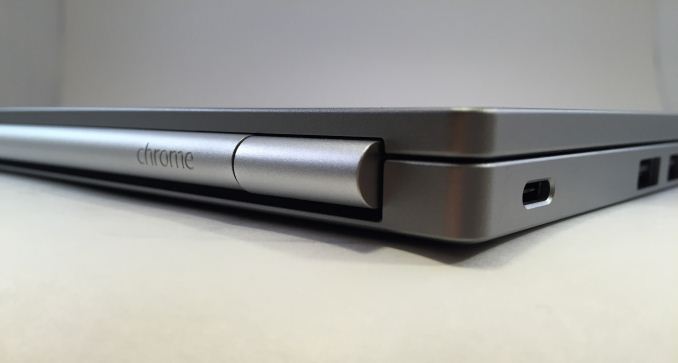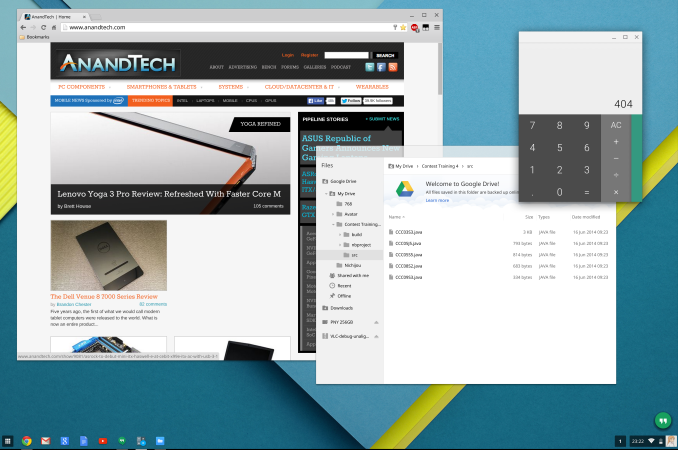The Chromebook Pixel (2015) Review
by Brandon Chester on March 16, 2015 8:00 AM EST- Posted in
- Laptops
- Chrome OS
- Chromebook
- Chromebook Pixel
Final Words
Despite its limitations, it's really hard to not like the Chromebook Pixel. Google has clearly put a lot of thought and effort into designing it, and what it does do it does really well. I think the move to USB Type-C is forward thinking, and makes the Pixel very versatile when it comes to connecting to both current and future displays and peripherals. The little details like tapping the top to see the remaining battery capacity, and the ability to charge on either side also help make it a very lovable laptop.
The Pixel's hardware is top notch. The build quality is every bit as good as what you'll get on a MacBook Retina, and both the keyboard and touchpad are comfortable to use. The CPU and RAM are completely overkill for running Chrome OS, but given that the Pixel has absolutely stellar battery life I'm not complaining about the additional hardware power. I think Google could have done more to calibrate the display, but in all honesty I doubt any users who buy the Pixel will be bothered by it, and it is still incredibly sharp.
The only big criticism I can really throw at the Pixel is the fact that its software is limited. But that is the entire point of how Chrome OS has been designed, and I do not know if it really makes sense to complain about something doing exactly what it was intended to do just because you wish it could do more. Chrome OS is definitely not the OS for everyone though, and although you can run other versions of Linux overtop, it's not exactly a real solution to the problem.
The final question is obviously whether or not someone interested in the Pixel should buy one. The answer is more complicated than a yes or a no. For anyone who wants to develop with Chrome OS in mind, the Pixel is the laptop to buy if it is within their budget. Other Chromebooks are definitely more affordable, but the Pixel is just so much nicer than any other Chromebook. I think that the Pixel can also be an appealing device for any user who can work within the limitations of Chrome OS, although I heavily stress that buyers make sure they know exactly what those limitations are before they spend $1000 on a laptop.
Google clearly doesn't intend for the Pixel to be a mass market item. It's quite expensive, it runs Chrome OS, and it's only sold in the US and the UK. There's clearly a small market for people that want a laptop like the Pixel though, and those are the people that Google are targeting. I am not one of them, and I do not know many people who are, but they do exist. In the end I find myself wishing that the Pixel could do more, because it's a genuinely nice laptop. I really like the Chromebook Pixel, but I personally just couldn't justify buying it.












123 Comments
View All Comments
Selden - Tuesday, March 17, 2015 - link
New Macbook: mobile processor, 480px camera, *1* USB Type-C port, 5 Gb iDrive space. $1299.New Pixel: i5, 720px camera, 2 USB Type-C, two USB Type A ports, 1 Tb of Google Drive space for 3 years. $999
I'
BackInAction - Monday, March 16, 2015 - link
I don't think Google intends for this to be something Joe Public will purchase. More of a ChromeOS Developer tool?Any comparison between this and other laptops is meaningless because it isn't meant to be compared with anything.
chlamchowder - Monday, March 16, 2015 - link
I don't know if it's the best idea to develop for a device more powerful than what most of the userbase will buy.The 64 GB version looks like a decent platform to put Linux on, as long as you don't try to store too much. After all, the lowest end original Surface Pro had 64 GB, and Windows programs tend to be heavier on storage. But I'm not sure I'd pay $1300 to tinker with Linux on it.
coder543 - Monday, March 16, 2015 - link
In general, developer machines *have* to be more powerful than the consumer machines the software will run on. Just because you're developing on a powerful rig, doesn't mean you won't test your software on weaker hardware along the way.It's not exactly the same thing, but a great example of this is game development. I literally could not run the Unreal Engine 4 development tools reliably on a Mac mini with 4GB of RAM. It would crash often due to running out of memory. Once I upgraded it to have 16GB of RAM, these problems all disappeared. UE4 allows you to develop games for everything from smartphones to the most powerful desktops, yet there is absolutely no way you could run the developer tools on a smartphone -- even if it is the platform you're targeting, and you don't think it's good to develop on more powerful hardware than you're targeting.
chlamchowder - Monday, March 16, 2015 - link
I said develop for, not develop on. I really doubt developers will want to code right on Chrome OS. They're probably following a similar model to cell phone app development, where you write/compile your code on a 'real' machine, and then package/deploy it to a test machine (cell phone, or Chromebook).With that model, using the Chromebook Pixel as a test platform might not be the best idea. An app that performs decently on the Pixel might not do so well on lower end Chromebooks.
I suppose you could drop a full blown Linux distro or Windows on a Chromebook Pixel and use it for coding...but then limited storage could be an issue.
extide - Monday, March 16, 2015 - link
But its not a *testing* platform, it's a *developing* platform. Also, great for users who'd like to put Linux on.chlamchowder - Monday, March 16, 2015 - link
Developing *on* Chrome OS seems like a horrible idea, even on the Pixel.To start, Chrome OS doesn't come with any development tools (though there's a messy way to get GCC on it). Assuming you manage to get a build environment set up, you then have to deal with very limited storage. Want to store local copies of several large projects? GLHF. Then, what about compilation times? A Broadwell i5 ULV chip is great for an ultrabook, but a desktop with an adequately cooled, higher clocked i7 will blow it out of the water.
Any laptop or desktop for the same price is much better for coding.
melgross - Monday, March 16, 2015 - link
A developer tool doesn't need to be made out of aluminum. No, Google is clearly trying to make a high end laptop to compete with Apple. Since Chrome still isn't nearly as useful as either Windows of OS X, this is a very limited device. Are they worth more than $1,000? No way nearly.Hanoveur - Monday, March 16, 2015 - link
No, Google is on record saying they gave these away to the developers at the Google Developers Conference and were simply making them available for the general public to buy. They aren't expecting to sell many of them. Look it up.And why wouldn't someone buy this? People could buy a Toyota Corolla to simply drive from point A to point B, but there are those that choose the Infinity to do exactly the same thing. It's all about preference. It might seem insane to some people, but people like what they like. Everyone elses world and tastes do not revolve around yours.
chlamchowder - Monday, March 16, 2015 - link
It's just difficult to imagine who's tastes this would fit.